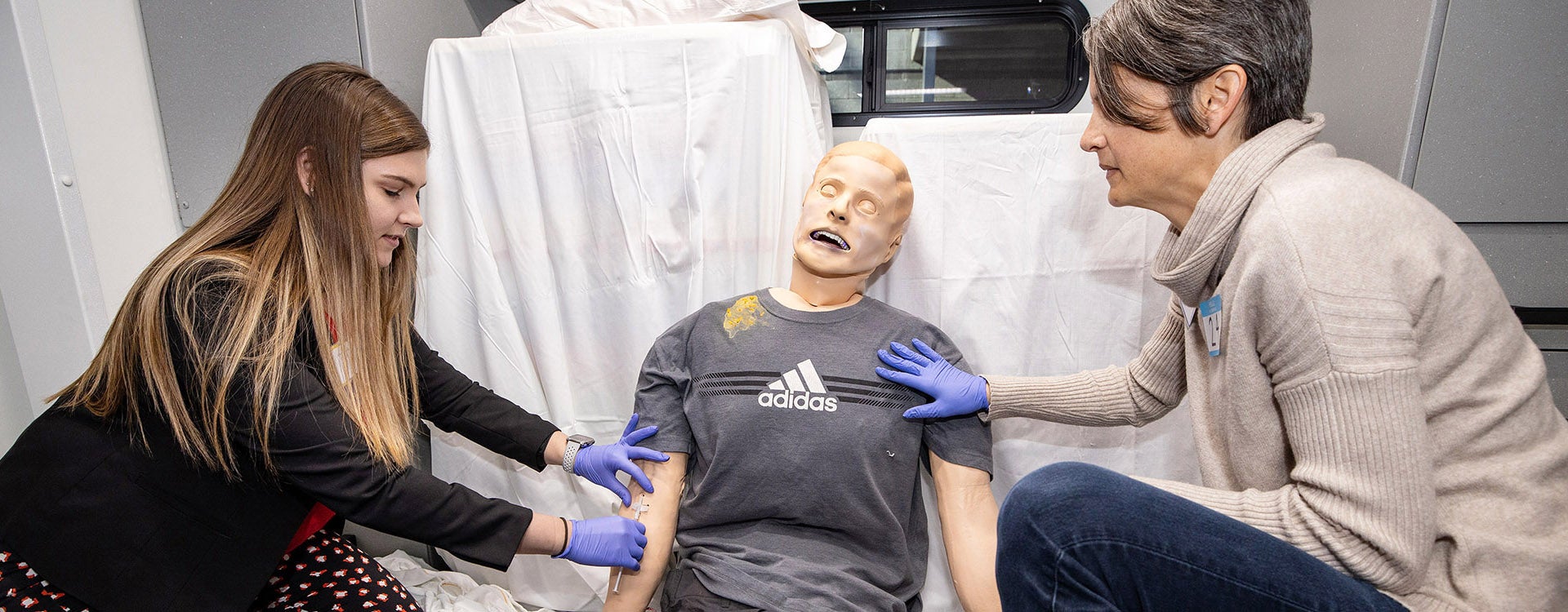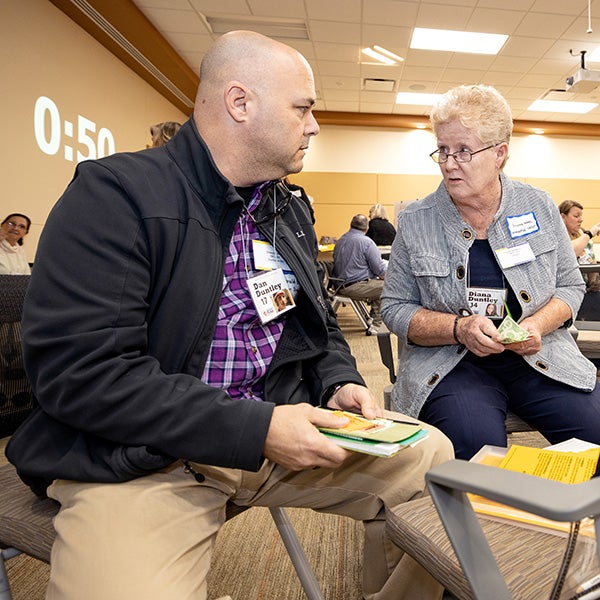Rural Health Symposium addresses rural health issues including opioids, poverty
When Dr. Venus Evans-Winters was growing up on the south side of Chicago, stress made her grind her teeth – but luckily the problem was caught by good dental care. This is just one example of the interprofessional care discussed at the third annual Rural Health Symposium on Feb. 26-28.
Held at Eastern Area Health Education Center, the symposium brought together East Carolina University’s Brody School of Medicine, College of Education, College of Nursing and other partners to improve health in eastern North Carolina and beyond.

Allison Tempel, left, and Eleanor Kipp participate in a “Start to Breathe Overdose Reversal” session during the Rural Health Symposium at Eastern AHEC on Friday. (Photo by Rhett Butler)
“We’re not usually all in the same room, are we?” Evans-Winters asked the audience of around 170 people, including educators, administrators, researchers, physicians, nurses, midwives, counselors, social workers, pharmacists and dentists.
Evans-Winters, a professor of education and the first black woman to reach the rank of full professor at Illinois State University, was the keynote speaker at a new preconference evening event led by ECU’s Rural Education Institute.
“We’re taught that if a child is having trouble in school, it’s an individual or family problem,” Evans-Winters said. “What we’re not talking about across the professions is that these children are witnesses to systemic issues like mass incarcerations and violence.”
A panel discussion on trauma-informed care in the pediatric population addressed the importance of looking at the “other ACEs” – not just Adverse Childhood Experiences, but also Adverse Community Environments.

Dr. Venus Evans-Winters, far right, was part of a panel on trauma informed care in the pediatric population at the Rural Health Symposium at Eastern AHEC. (Photo by Jackie Drake)
Stress, trauma and other mental health issues can impact various populations from farmers to military and can lead to issues like opioid use, depression, and suicide – issues compounded by lack of access to care.
“We have to look at the whole person and their entire environment,” said Maggie Sauer, director of the Office of Rural Health at the NC Department of Health and Human Services. “People in rural areas die at a faster rate that their urban counterparts. I’m so grateful to ECU for the work they’re doing to make a difference.”
North Carolina opioid overdose deaths went down in 2018 for the first time in five years, Sauer said, but much work remains to be done.
The symposium hosted ECU’s Mobile Healthcare Simulation Unit bus for the “Start to Breathe: Interactive Opioid Overdose Reversal Training.”
Beyond reducing overdoses, a biopsychosocial approach that includes medication and counseling provides more comprehensive care, but many barriers remain.
Only around 25% of individuals with opioid use disorders received any medication-assisted treatment, said Dr. Shawn Ryan, chair of legislative advocacy for the American Society of Addiction Medicine. The two main causes are lack of standardization of care, and providers not getting appropriately paid to provide the standard care. Stigma also plays a significant role.
“Practices are not running to the front of the line to take on difficult patients for little money,” Ryan said as he outlined the Patient-Centered Opioid Addiction Treatment (P-COAT) Model. “We want to standardize delivery of care and pay the people who are willing to do it. We have to take these opportunities to build infrastructure and de-stigmatize the disease. Telehealth absolutely has to be part of the solution.”

Participants in the Rural Health Symposium at Eastern AHEC discuss how to spend their money during a Poverty Simulation session on Friday. (Photo by Rhett Butler)
Teledentistry and telepsychiatry were also covered during the symposium.
Seventy-four counties in North Carolina are considered Health Professional Shortage Areas (HPSAs) for dental health, according to NC DHHS. Teledentistry can help overcome barriers like these, according to Dr. Rob Tempel, associate dean for extramural clinical practices in the ECU School of Dental Medicine.
Ninety counties in NC are considered HPSAs for mental health, according to NC DHHS. The Healthier Lives at School and Beyond collaboration between ECU and Duplin County Schools has completed 1,018 telehealth visits for behavioral health, oral health and nutrition. Participants also learned about NC-STeP, the Statewide Telepsychiatry program.
Two sessions addressed suicide in military and farming populations. Veterans are 1.5 times more likely to die by suicide than the general population. The rural suicide rate is 45% higher than the urban rate. Both sessions focused on the importance of screening.
The NC Agromedicine Institute put on a “farm dinner theater” that used first-person stories to address agricultural health and safety.
An interactive poverty simulation led by Julie Kulas, a teaching instructor in the ECU College of Health and Human Performance, used play money to help participants understand the serious issues faced by low-income families in eastern NC.

Eastern AHEC Student Services Director Blair Sovaca, left, participates in a Poverty Simulation event with Daniel Paul and Amelia Muse on Friday. (Photo by Rhett Butler)
A networking event supported by the ECU Medical and Health Sciences Foundation allowed participants to continue the conversation beyond the symposium. Other symposium partners included the University of North Carolina Eshelman School of Pharmacy and Vidant Health.
Other sessions covered a variety of topics including Stop the Bleed, dementia biomarkers, maternal health, treatment of wastewater contaminants, ethical billing practices in integrated care, managed care and the changing landscape of health care
“The Rural Health Symposium is a truly unique program,” said program planner Mary Stuart Peaks, assistant director of medical, dental and pharmacy education at Eastern AHEC. “It fosters robust discussion and community partnerships, and excites the expansion of established programs into new venues. The content of this year’s symposium was as diverse as the professionals who filled the room. I can’t wait to see what the 2021 symposium has in store. Stay tuned!”
Next year’s Rural Health Symposium will be Feb. 25-26, 2021. More on upcoming continuing education programs is available on the Eastern Area Health Education Center’s website.
-by Jackie Drake, Eastern Area Health Education Center